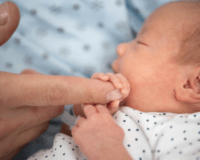Seven ways children react to grief

One of the hardest things after my husband died was not only dealing with my grief but also watching my children try to grapple with theirs.
My youngest two kids were four and six years old. I had three coming-of-age boys (twelve, fourteen, and sixteen years old) who needed their dad, a seventeen-year-old daughter who was her daddy’s girl through and through, and a just-launched nineteen-year-old son.
I didn’t know much about the ways children grieve, but I learned early on that children grieve differently.
Grief on their terms
Children grieve differently than adults. Teens grieve differently than preschoolers. Boys grieve differently than girls.
Even two kids the same age with the same loss can grieve differently because of personality, experience, their home environment, or their relationship with the one who died. Kids can suffer many kinds of loss—the death of a sibling, grandparent, or parent, a chronic diagnosis for themselves or a family member, a devastating divorce, adoption loss, or even a move that takes them away from friends, school, and the familiar.
As a parent navigating our kids through grief, discerning signs of our grief can be difficult. I’m sure to many outsiders, my kids looked pretty normal in the weeks and months following their dad’s death.
My six-year-old played around the neighborhood with friends like any other six-year-old but cried himself to sleep every night on the pillow next to mine. My teens just wanted to be normal and appear normal, especially among their friends and out in public, but their pain was always just under the surface.
Kids tend to box up grief and unpack it in spurts, unlike adults who constantly process the loss. Children can mask pain because it’s too big to understand or put into words. They can stuff grief because the emotions are too hard and too overwhelming.
As parents, we need to discern our kids’ signs of grief to help them through. Because this is certain—if our children don’t grieve now on their terms, grief will come back later on its terms.
7 Ways Children React to Grief
1. The same questions over and over
I think my four-year-old cried a thousand times those first two years, “I miss Daddy!”
It was usually from the backseat where I could easily respond. But sometimes it happened at the most inopportune times—like the very moment we went onstage to join my oldest daughter who’d just won a state scholarship program.
As confetti streamed down and cameras flashed, my littlest clung to me and cried that she missed her dad. I’d promised myself from the beginning that no matter how many times she cried or asked questions, I would stop and respond.
I never expected them to be over it because toddlers and preschoolers can’t fathom the permanency of loss. They need the reassurance of our gentle and consistent response.
Each time we answer their questions or hug them when they cry, we help them process emotions they can’t even put into words.
2. Embarrassment about grief
Older children often want to hide their loss from friends or teachers to be “normal” and escape the grief bubble. This became razor clear weeks after Dan died when our church asked us to participate in a sermon illustration.
People were to hold up signs showing the hardship they’d gone through and then, on the back, how God had met their need. My teen boys wanted none of it.
Life had imploded for them and they were reeling from grief. The last thing they wanted to do was share it openly with the world.
We need to give our kids permission to share on their terms as they’re comfortable, but also make sure we’re starting conversations about loss at home where vulnerability is safe.
3. Irritability, anger, or complaining
This one’s tricky because it can be hard to tell the difference between normal kid and teen behavior and grief.
We know grief can trigger anger, and that can surface as irritability with siblings or complaining about school stuff. I tried to be a student of my child.
I considered my kids’ personalities before loss against their current behavior and toggled between giving consequences at times and grace at other times when I felt like it came from grief.
4. Withdrawal from activities
When my son’s high school basketball coach moved, he announced he wouldn’t play that season. It was one more loss after his dad’s death.
I knew he loved basketball, and I wanted him to stay active in extracurriculars—I struggled with whether to push him or let him sit out the season. A friend gave me some perspective at just the right time.
This son wasn’t withdrawing from everything because he was still super active at church, with classes, and with friends. So I decided to let him have the space to let this go until he felt ready to jump back in.
5. Forgetfulness and distraction
If you’ve ever gone through grief or loss, then you’re well acquainted with the fog of grief.
While the rest of the world marches on, it’s like a bubble has descended that keeps your mind swirling with thoughts and worry and pain and loss. It’s nearly impossible to shake—though it will lift over time as grief is processed.
It’s called cognitive grief, and I saw it clearly in one of my teens’ standardized test scores. They had dropped pretty dramatically, though his grades held steady. I reassured my son it wasn’t him, that it was an outward sign of very real emotions taking up brain space and that the fog would lift.
6. Anxiety
Loss ushers in all kinds of new fears for kids. My kids worried that something might happen to me or that they might die young like their dad. Some kids have separation anxiety, nightmares, or general anxiety that shows up as stomachaches or headaches.
Sometimes seeing something that reminds them of loss will trigger an anxiety attack. That happened for us when an ambulance was called several years after my husband’s death, but it brought my youngest back to the ambulance that had taken her dad away forever.
While it’s important to help our kids separate reasonable from unreasonable fear, we need to listen to their fear and pray with them about their worries.
7. Growing into grief
There was no way my four-year-old could understand the full extent of her loss when it happened.
But, as she’s grown, she’s seen dads bringing flowers to their daughters after the recital and taking them to the father-daughter dance. Each stage makes that grief resurface as she realizes all that a dad is and does.
Our kids will continue to grow into their grief. We need to let them know it’s okay when that grief resurfaces and it’s okay to feel sadness lacing even the best events in life.
Consider a few extra resources:







